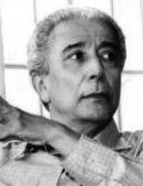

Fernando Antônio Novais was born in Guararema, a town in the interior of the state of São Paulo, in 1933. He graduated in History from the University of São Paulo, where he also worked as a teacher and researcher between 1957 and 1986. He was initially an assistant professor to Alice Piffer Canabrava (1911-2003) in the subject of História Econômica Geral e Formação Econômica do Brasil [General Economic History and Economic Formation of Brazil] at the Faculty of Economic and Administrative Sciences, which had been recently created at the USP. However, it was in the subject of Modern and Contemporary History at the USP's History department, under the guidance of Eduardo D'Oliveira França (1917-2003), that he developed his research in line with the aim of the subject to scrutinise the links between Brazilian history and European history, particularly the history of Portugal.
Between 1958 and 1964 he was part of the group of researchers that formed the Seminário Marx [Marx Seminar] together with intellectuals such as Bento Prado Jr., Fernando Henrique Cardoso, Roberto Schwarz and José Arthur Giannotti. This way, his training encompassed an advanced reading and interpretation of Marx and the long term influences of the Annales, which were very influential in the first steps taken by USP historiography in the 30s and 40s. However, his readings went far beyond the possible limits posed by the urgency of explaining the entering of Brazil into world capitalism and the long term. When asked by this biographer about his readings of José Ortega y Gasset (1883-1955), given that he mentions the Spaniard in the Introduction to his doctoral thesis when he states that the study of transitions in history is a fundamental process, he quickly replied: "Ortega wrote the best Marxist definition of history, which is that man does not have a nature, he has a history." Thus, moving between readings of Karl Marx (1818-1883), Fernand Braudel (1902-1985) and José Ortega y Gasset, and under the direction of Oliveira França in his search for links between the history of Portugal and the Brazilian experience— a fact that brought him closer to authors such as Jaime Cortesão (1884-1960), Vitorino Magalhães Godinho (1918-2011) and Joaquim Barradas de Carvalho (1920-1980)— Fernando Novais developed the concept of the Old Colonial System , a cornerstone of the historiographical debate on the meaning of colonisation and Brazilian independence.
This work is financed by national funds through FCT - Foundation for Science and Technology, I.P, in the scope of the projects UIDB/04311/2020 and UIDP/04311/2020.
